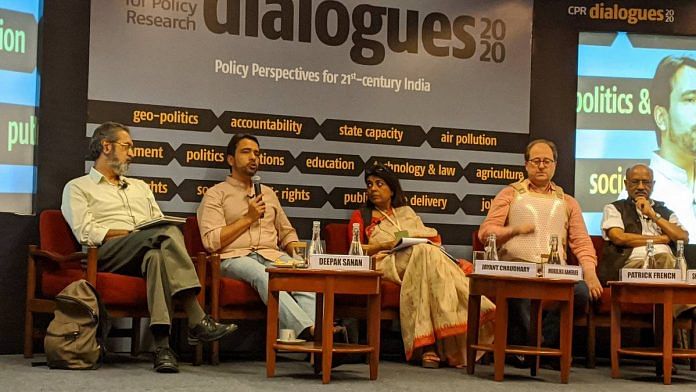New Delhi: Do India’s political elites have a stranglehold over power and governance in India? Do they care for democratic processes such as attending Parliament or asking questions in legislature?
Are dominant castes more likely to form political families? Or are political dynasties actually on the decline but face pressure to contest elections due to the high stakes? And, most importantly, do the political elites impact the state’s capacity to provide for its citizens?
These and other critical questions surrounding contemporary Indian politics formed the core of a panel discussion on Political Elites and Local Bureaucratic Capacity on day two of Centre for Policy Research (CPR) Dialogues 2020 Tuesday.
Not surprisingly, the debate was vigorous and engaging.
Also read: Regulatory lapses & policy uncertainty are pushing infra financing into crisis: Experts
Political elites in India
Citing data from the Trivedi Centre for Political Data and the Association for Democratic Reforms, CPR’s senior fellow Rahul Verma said 20 per cent of political families that contested elections in 2020 had been fighting polls since 1980.
Political elites who are in power are less likely to attend Parliament or ask questions, he said.
Verma also pointed out that a substantial number of leaders who had been in power for a long time were more likely to have their income in movable assets and also have criminal records. He added that people from upper or dominant castes were more likely to form political families compared to lower castes.
Following Verma’s comments, ThePrint’s Editor-in-Chief Shekhar Gupta cautioned everyone about the perils of generalising data. He added that Verma’s presentation focused mainly on Uttar Pradesh and the Hindi heartland.
“There is an India beyond the Hindi heartland. In the south, things work opposite to the way in UP and West Bengal,” said Gupta.
He added that political dynasties in India were on the decline, and the only dynastic party which had been successful in creating a cadre was the Shiv Sena.
Deepak Sanan, former IAS officer and senior visiting fellow at CPR, said it was impossible to have a cadre-based party which is not ideological.
On the question of whether the political elites have the power to create a strong cadre, Gupta said it is the Rashtriya Swayamsevak Sangh that acts as a “nursery of political talent”.
Patrick French, dean of the School of Arts and Sciences at Ahmedabad University, said, “People in political families are pressurised to contest elections, as there is so much at stake.”
French explained that the study of dynasty politics would be now coupled with understanding financial capital as well as the ‘celebrity factor’.
How political elites impact the state’s capacity
On the political elites’ impact on the state’s capacity to provide for its citizens, Sanan said there is a need to move away from the notion of weak state capacity.
“A benevolent patron will always succeed and can defeat the political elite. However the critical issue to understand is that for a politician to succeed he/she will have to adopt the predatory nature of politics to sustain their power,” he said.
To sustain power, there is a need to dominate state machinery at the local level, he added.
Former Rashtriya Lok Dal MP Jayant Chaudhary, grandson of former prime minister Charan Singh, stressed on the need for greater financial capital to fight elections now as the country’s rural economy is much bigger.
The conversation then steered towards women in positions of power.
Chaudhary said he could see more women, especially those who are younger, contesting elections and winning the confidence of people.
Across the country, be it the Hindi heartland, Rajasthan or south India, women were being more assertive and coming to the forefront, added Gupta.
Also read: Civil servants and politicians aren’t worried about outcomes of govt spending: Experts
ThePrint.in is the digital partner for CPR Dialogues. Read this series of curtain-raiser articles ahead of the conference.




A more appropriate discussions will be on political elite and their media parasites.
As long as the Elite treat politics as successful money making business and make suitable legislation to continue doing that the parasites will also flourish with them.
If the media is willing to expose the second / third generation politicians who have got into BIG money without doing a days work in life, the discussion on How political elites are placed in India today, and their impact on state capacity will have some meaning.
Otherwise it is just an event.
### Revati Krishnan congrats for writting This. Good Writting. Thats for I eagerely wait for your pieces.